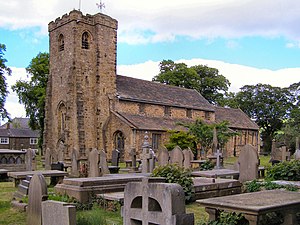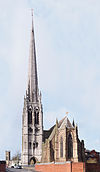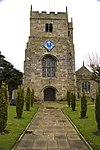Uiser:Vampibyte/Grade I listed kirks in Lancashire

Lancashire is a coonty in North Wast Ingland. In 1974 pairts o the historic coonty war divided atween Greater Manchester, Merseyside, Cheshire an Cumbria, an pairt o the West Riding o Yorkshire wis transferred intae the coonty, creatin the na-metropolitan coonty o Lancashire. Together wi the unitary authorities o Blackburn wi Darwen an Blackpool it now maks the ceremonial coonty o Lancashire.[1][2][3]
Kirks
| Name | Location | Photograph | Notes |
|---|---|---|---|
| St Michael | Aughton |  | St Michael's dates feckly frae the 14t century, wi remains frae the 12t an 13t centuries, includin a blocked Norman sooth doorwey. The north arcade dates frae the 15t century, an the north aisle frae the next century. The kirk wis restored in 1876 bi W. an J. Hay, wha fenby rebuilt the 16t-century queir. On the north side o the kirk is a steeple wi a peel, broached tae an octagonal bell stage an owertapt bi a spire. In a bole inside the north waa o the kirk is pairt o an Anglo-Saxon cross-heid that haes been dated tae aboot 850.[4][5] |
| St Mary-le-Ghyll | Barnoldswick |  | The kirk dates frae the 15t–16t century, wi fabric remainin frae the 13t century. The wast steeple is dated 1524. Inside is a set o buchts, maist frae the 17t century, an some frae the 19t. Thare is fenby a hale 17t-century three-decker poupit.[6][7] |
| St Peter an St Paul | Bolton-bi-Bowland |  | This kirk dates frae the 15t century; the Pudsay Chaipel wis added in the early 16t century. In 1885–86 the kirk wis restored bi Paley an Austin, wha replaced the ruif o the nave. The ravels o the wast steeple an the body o the kirk are aw embattled. In the airch atween the queir an the chaipel is a cairn tae Sir Ralph Pudsay, lord o the manor o Bolton, cairved wi the figurs o himsel, his three wives, an his 25 childers.[8][9] |
| St Michael | Bracewell |  | Awtho maist o the kirk dates frae the 15t or early 16t century there is earlier fabric, includin a Norman sooth doorway an queir airch. At the wast end is an embattled steeple. Inside the kirk, the font is Norman, an the poupit is Jacobean. The deas war makkit bi Robert Thompson.[10][11] |
| St Helen | Churchtown |  | The auldest fabric dates frae the 13t century, but maist o the kirk is frae the 15t an 16t centuries. It wis re-ruifed an the clerestory wis added in 1811, an the kirk wis restored in 1865–66. At the wast end is an embattled steeple, an on the sooth side o the kirk are an airchle an a pail hoose. Inside the kirk, the piscina dates froae aboot 1300. Thare are waa pentins frae the 15t an 17t centuries that war restored in 1986.[12][13] |
| St Bartholomew | Colne |  | The kirk dates mainly frae the early 16t century, awtho the north arcade is frae the early 13t century. It is in Parpen style. Repairs war makt in 1815, an the kirk wis restored in 1889–91 bi Paley, Austin an Paley; in the restoration the single north aisle wis replaced bi a dooble aisle. Maist o the plenishins inside the kirk are bi Paley, Austin an Paley. Thare are fenby moinments an bresses datin frae the 17t century an efter.[12][14] |
| Aw Hallows | Great Mitton |  | Aw Hallows dates frae the 13t century, wi a wast steeple added in the early 15t century, an a north chaipel in the late 16t century. Inside the kirk is a wast bauks, an a queir hallan incorporatin medieval widwirk. In the chiancel are a threeple sedilia an a piscina. The chaipel conteens moinments, some wi effigies, tae the members o the Shireburn faimily.[15] |
| St John the Evangelist | Gressingham |  | The kirk wis pairtly rebuilt in 1734, an incorporates 12t-century fabric. It wis restored in 1862 bi E. G. Paley. In the sooth waw o the nave is a Norman doorwey, an built intae the wast waw o the nave is a stane wi Saxon cairving. Thare are twa maire stanes wi Saxon cairving inside the kirk. Aw an in the kirk is a poupit dated 1714, an buchts.[12][16] |
| St Cuthbert | Halsall |  | The queir dates frae the 14t century, an the nave wis rebuilt efter in the same century. The wast steeple dates frae the early 15t century. The kirk wis restored in 1873, an again in 1886, bi Paley an Austin. The steeple haes a square foomd, an octagonal bell stage, an a spire wi lucarnes. Eikit tae the sooth o the steeple are the remains o the forgane grammar schuil. Inside the kirk, some o the staws hae misericords, an poppyheids on thair deas ends. Thare is 14t-century stained glass in twa o the aisle windaes.[4][17] |
| St Patrick's Chapel | Heysham |  | This is a ruined chiapel datin frae the 8t or 9t century. Anely the east waw an pairts o the north an sooth waws hae survived. It is a scheduled moinment. Near the ruins are twa groups o rock-cut graffs wi sockets for markers; ilk group o graffs is listed separately frae the kirk at Grade I.[12][18][19][20][21] |
| St Peter | Heysham |  | St Peter's wis founded in the 8t or 9t century, an retains Saxon featurs, includin a doorwey (now blocked) in the wast end. Thare are early Norman capitals in the queir arch. The rest o the queir wis built aroond 1340–50, the sooth aisle wis added in the 15th century, an the north aisle in 1864 when E. G. Paley carried oot a restoration. In the sooth queir aisle is a Norseman hogback stane.[12][22] |
| St Margaret | Hornby |  | A kirk heas been on the steid since 1338, but the auldest pairt o the present kirk is the steeple, built in 1514. The nave wis rebuilt in 1817, an the kirk wis restored bi Paley, Austin an Paley in 1889. At the wast end is an octagonal steeple, an at the east end is a semi-octagonal apse. Aw the ravel are embattled. Inside the kirk are twa skoilts o Anglo-Saxon crosses.[12][23] |
| Lancaster Priory | Lancaster |  | Maist o the fabric dates frae the late 14t an the 15t centuries an efter, awtho thare are earlier skoilts. The wast steeple wis added in 1753–74 bi Henry Sephton. Alterations war makkit tae the kirk in the 19t century. In 1903 Austin an Paley added the sooth hallan an the four-bay Keeng's Own Regiment Chaipel on the north side. Inside the kirk is a wast bauks. The plenishins include finely cairved canopied staws datin frae aboot 1340, containin misericords. An aw in the kirk is a collection o Anglo-Saxon cairved stanes.[12][24] |
| St Leonard (auld) | Langho |  | St Leonard's wis built in about 1557, a time whan few new kirks war bein built; some o its fabric an fittins are thocht tae hae come frae nearby Whalley Abbey. It was restored in 1879, whan the wast bellcote was added. The kirk is now redundant an its role haes been taen o'er bi a newer kirk on a different steid. The aulder kirk is now under the care o the Churches Conservation Trust.[12][25][26] |
| St Wilfrid | Melling |  | St Wilfrid's dates mainly frae the 15t century, but haes retained a windae datin frae aboot 1300, an a 14t-century sootheast chiapel. The kirk wis altered in 1763, whan the clerestory wis added. It wis "modernised" in 1841, an thare war maire changes efter. Skoits o auld stanes, includin pairt o a cairved leck frae aboot the 10t century, are set intae the vestry waa. Ten staps inside the kirk rise frae the nave tae the queir, acause o the lie o the laund. The sootheast chaipel haes an auncient aumbry, an a squint throu tae the altar.[12][27] |
| Pleasington Priory | Pleasington |  | A Roman Catholic kirk designed bi John Palmer, this wis built atween 1816 an 1819. A thanks offerin bi John Francis Butler, it is a lairge biggin, withoot a steeple, in Gothic Revival style. The windae tracery is based on the Decorated an Parpen styles. At the wast end is a lairge rose windae, an at the east end is a polygonal apse.[12][28] |
| St Walburge | Preston |  | This is a Roman Catholic church designed by Joseph Hansom. Building started in 1850, and the church opened in 1854. The tower was built in about 1857, to which the spire was added in 1867. The apse, designed by S. J. Nicholl, was built in 1872. The body of the church is constructed in sandstone, and the steeple – one of the highest in England at 309 feet (94 m) – in limestone. In the west front is a large rose window.[12][29] |
| St Wilfrid | Ribchester |  | The church dates from the 13th century, with later additions and alterations. It was restored in 1881, and again after a fire in 1917. The 15th-century west tower is embattled. Inside the church is a west gallery, carried on four Tuscan columns, and box pews, two of which bear the dates 1735 and 1761. In the chancel are a 14th-century piscina and sedilia, and a squint to the exterior of the church. The octagonal pulpit is dated 1636. The north chapel, known as the Dutton Quire, has a 14th or 15th-century wall painting depicting Saint Christopher, and in its east window are fragments of medieval glass.[12][30] |
| St Michael | St Michael's on Wyre |  | St Michael's dates mainly from the 15th century, although there is a blocked lancet window in the west end of the church probably from the 13th century. The broad west tower probably dates from 1549, and it is likely that it was raised in height in 1611. On the north side of the church is the Butler Chapel, founded in 1480 and restored in 1797 and 1936. The chapel contains 14th-century glass, and on the north wall of the chancel is a 14th-century wall painting depicting the Ascension.[12][31] |
| St Leonard the Less | Samlesbury |  | The church dates mainly from 1558, when it was rebuilt by the 3rd Earl of Derby, but there is remaining fabric from the late 12th century. The northwest tower and the timber-framed south porches were added in 1899. Inside the church are box pews with dates between 1678 and 1756, two levels of a three-decker 18th-century pulpit, and a set of armour that is believed to have belonged to Thomas Southworth of Samlesbury Hall.[12][32] |
| St Andrew | Slaidburn |  | St Andrew's dates probably from the early 15th century, with additions and alterations made later that century, and in the early 17th century. It is constructed in sandstone with a stone slate roof, and has a west tower. Inside the church is woodwork of good quality, including pews from the 17th and 18th centuries, a five-decker pulpit from the 18th century, and a rood screen possibly from the 1630s.[33] |
| St Saviour | Stydd |  | The church is the only survivor from a group of buildings acquired by the Knights Hospitallers in the late 13th century. Its plan consists of a simple rectangle with a southwest porch. In the north wall are two Norman windows and a doorway. The south doorway is in Early English style, and there are two Perpendicular south windows.[12][34] |
| St John the Baptist | Tunstall |  | The oldest fabric in the church is from the 13th century, but most dates from the 15th century. A vestry was added in 1907. The church is constructed in sandstone with slate roofs. It has north and south aisles, a west tower, and a two-storey south porch. Inside are a 13th-century piscina and sedilia, and a preserved Roman altar.[12][35] |
| St Thomas the Martyr | Upholland |  | The nave of the church originated as the east end of the Benedictine Upholland Priory founded in 1319. The west tower was added in the 15th century. In 1882–86 the chancel was added by Basil Champneys. On the north side of the chancel are steps leading down to a crypt that is used as a vestry. Inside the church is a churchwardens' pew dated 1679. The east window contains stained glass designed by Henry Holiday.[4][36] |
| St Mary and All Saints | Whalley |  | The church dates from the 13th century, with alterations and the addition of the west tower in the 15th century. The south doorway is Norman, and there are fragments of Saxon carving in the south wall. Some of the windows are in Early English style and others are Perpendicular; the tower is also Perpendicular. The interior is notable for its wooden carved furnishings. The 15th-century choirstalls were moved from Whalley Abbey, and incorporate misericords and canopies. Other woodwork includes screens, a variety of pews, benches, and the organ case.[12][37] |
References
🔥 Top keywords: Main PageCarles PuigdemontGazpromSpecial:RecentChangesWikipedia:Contact usWikipedia:Commonty YettFacebookAshley StorrieSpecial:MyTalkRaisa VasilyevaSpecial:SearchElon MuskContact lensFile:Nvidia logo.svgFile:Real Madrid CF.svgWikipedia collogue:Commonty YettFile:KFC logo.svgKFCWikipedia:AbootScots leidWikipedia:General disclamationScotlandWarld War IISuzuki EsteemPatricia NealFile:Starbucks Corporation Logo 2011.svgSan Juan, Metro ManilaFile:New England Patriots logo.svgFile:Chelsea FC.svgThe BahamasToyota AgyaFile:Pizza Hut logo.svgFile:University College London logo.svgWikipaediaTom BradyAustrailieGujaratHelp:ContentsFile:Manchester City FC badge.svg